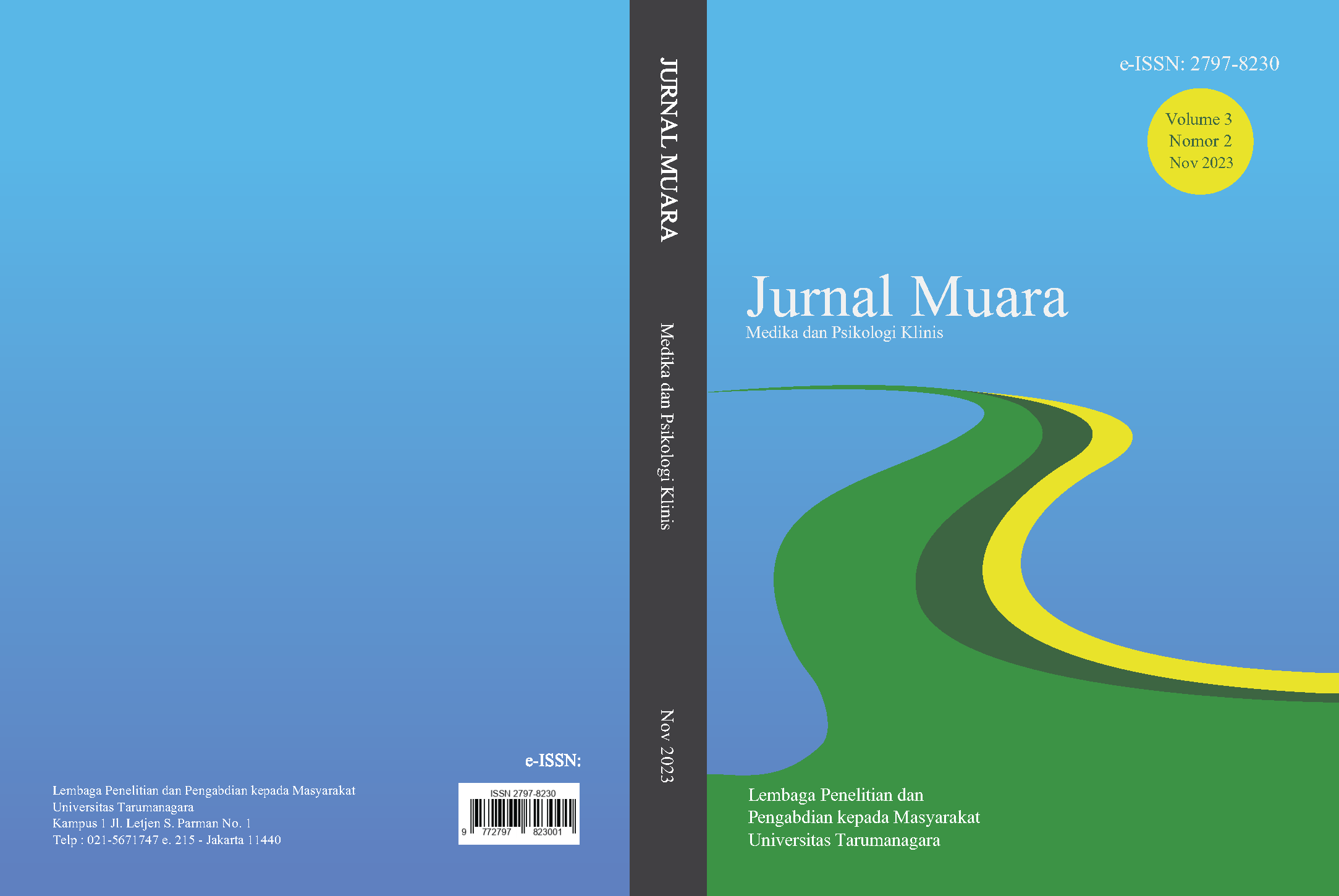PERAN SEMANGAT DALAM MEMEDIASI HUBUNGAN ANTARA RASA SYUKUR DAN DEPRESI PADA REMAJA
Main Article Content
Abstract
Depresi adalah gangguan mental yang umum ditemukan yang mana dapat secara negatif memengaruhi perasaan, cara berpikir, dan tindakan individu. Prevalensi dari depresi mulai meningkat ketika individu memasuki usia remaja. Faktor biologis, keluarga, pertemanan, dan lingkungan memengaruhi terbentuknya depresi pada remaja. Depresi dapat dihindari jika dalam dirinya, remaja memiliki karakter seperti rasa syukur dan rasa semangat. Penelitian ini bertujuan untuk melihat peran rasa semangat dalam memediasi hubungan antara rasa syukur dan depresi. Penelitian ini merupakan penelitian kuantitatif non-eksperimental dengan metode korelasional. Alat ukur yang digunakan adalah VIA Youth Survey untuk mengukur rasa syukur dan rasa semangat, sedangkan Beck Depression Inventory (BDI-II) untuk mengukur depresi. Terdapat 101 partisipan usia 15-17 tahun dalam penelitian ini. Melalui metode bootstraping dengan program LISREL, dinyatakan rasa semangat dapat memediasi hubungan antara rasa syukur dan depresi, = .297, F(2,98) = 20.735, p = < .01, 95% CI [-1,186, -0,344]. Dapat disimpulkan bahwa rasa syukur dapat menimbulkan rasa semangat yang kemudian dapat melindungi remaja dari depresi.
Article Details

This work is licensed under a Creative Commons Attribution-NonCommercial-ShareAlike 4.0 International License.
This work is licensed under a Jurnal Muara Ilmu Ekonomi dan Bisnis Creative Commons Attribution-ShareAlike 4.0 International License.References
American Psychiatric Association. (2013). Diagnostic and statistical manual of mental disorders (5th ed.). https://doi.org/10.1176/appi.books.9780890425596
American Psychiatric Association. (2020). What Is Depression? https://www.psychiatry.org/patients-families/depression/what-is-depression
Cregg, D. R., & Cheavens, J. S. (2020). Gratitude Interventions: Effective Self-help? A Meta-analysis of the Impact on Symptoms of Depression and Anxiety. Journal of Happiness Studies, 22(1), 413-445. https://doi.org/10.1007/s10902-020-00236-6
Creswell, J. W. (2012). Educational research: planning, conducting, evaluating, quantitative and qualitative research (4th ed.). Pearson Education Inc.
Ford, R., King, T., Priest, N., & Kavanagh, A. (2017). Bullying and mental health and suicidal behaviour among 14- to 15-year-olds in a representative sample of Australian children. Australian and New Zealand Journal of Psychiatry, 51(9), 897–908. https://doi.org/10.1177/0004867417700275
Gillham, J., Adams-Deutsch, Z., Werner, J., Reivich, K., Coulter-Heindl, V., Linkins, M., Winder, B., Peterson, C., Park, N., Abenavoli, R., Contero, A., & Seligman, M. E. P. (2011). Character strengths predict subjective well-being during adolescence. Journal of Positive Psychology, 6(1), 31–44. https://doi.org/10.1080/17439760.2010.536773
Ginting, H., Näring, G., Van Der Veld, W. M., Srisayekti, W., & Becker, E. S. (2013). Validating the Beck Depression Inventory-II in Indonesia’s general population and coronary heart disease patients. International Journal of Clinical and Health Psychology, 13(3), 235–242. https://doi.org/10.1016/S1697-2600(13)70028-0
Iodice, J. A., Malouff, J. M., & Schutte, N. S. (2021). The Association between Gratitude and Depression: A Meta- Analysis. International Journal of Depression and Anxiety, 4(1). https://doi.org/10.23937/2643-4059/1710024
Kementerian Kesehatan RI. (2019). Laporan Nasional Riskesdas 2018. In Badan Penelitian dan Pengembangan Kesehatan (p. 198). Lembaga Penerbit Badan Penelitian dan Pengembangan Kesehatan (LPB). http://labdata.litbang.kemkes.go.id/images/download/laporan/RKD/2018/Laporan_Nasional_RKD2018_FINAL.pdf
Lam, K. K. L. (2021). The Mediating Effect of Gratitude in the Relationship between Zest for Life and Depression. Personality and Individual Differences, 171. https://doi.org/10.1016/j.paid.2020.110476
Lee, J. H. (2018). The Contributing Factors to Adolescent Depression [Unpublished manuscript]. Faculty of Community and Public Health, University of Michigan. https://digitalcollections.sit.edu/isp_collection/2813
Lorenzo, N. E., Zeytinoglu, S., Morales, S., Listokin, J., Almas, A. N., Degnan, K. A., Henderson, H., Nathan, A. C., & Lorenzo, N. E. (2021). Transactional Associations Between Parent and Late Adolescent Internalizing Symptoms During the COVID-19 Pandemic: The Moderating Role of Avoidant Coping. Journal of Youth and Adolescence, 50, 459–469. https://doi.org/10.1007/s10964-020-01374-z
Mash, E. J., & Wolfe, D. A. (2010). Abnormal Child Psychology. CENGAGE Learning.
Norfazilah, A., Hafizah, Z., & Azmawati, M. (2015). Poor Peer Support as a Predictive Factor towards Depression among Adolescent. Medicine and Health, 10(1), 48–57.
Park, N., & Peterson, C. (2006). Moral competence and character strengths among adolescents: The development and validation of the Values in Action Inventory of Strengths for Youth. Journal of Adolescence, 29(6), 891–909. https://doi.org/10.1016/j.adolescence.2006.04.011
Peltzer, K., & Pengpid, S. (2018). High prevalence of depressive symptoms in a national sample of adults in Indonesia: Childhood adversity, sociodemographic factors and health risk behaviour. Asian Journal of Psychiatry, 33, 52–59. https://doi.org/10.1016/j.ajp.2018.03.017
Peterson, C., & Seligman, M. E. P. (2004). Character strengths and virtues: A handbook and classification. American Psychological Association.
Rognli, E. W., Waraan, L., Czajkowski, N. O., Solbakken, O. A., & Aalberg, M. (2020). Conflict with Parents in Adolescent Depression: Associations with Parental Interpersonal Problems and Depressive Symptoms. Child Psychiatry and Human Development, 51(3), 442–452. https://doi.org/10.1007/s10578-020-00955-0
Santrock, J. W. (2015). Adolescence (16th ed.). McGraw-Hill.
Serrander, M., Bremander, A., Jarbin, H., & Larsson, I. (2021). Joy of living through exercise - a qualitative study of clinically referred adolescents’ experiences of moderate to vigorous exercise as treatment for depression. Nordic Journal of Psychiatry, 0(0), 1–14. https://doi.org/10.1080/08039488.2021.1909128
Soetikno, N. (2020). Descriptive Study of Adolescent Depression in Covid-19 Pandemic. 478, 588–592. https://doi.org/10.2991/assehr.k.201209.090
Sun, P., Sun, Y., Jiang, H., Jia, R., & Li, Z. (2020). Gratitude as a protective factor against anxiety and depression among Chinese adolescents: The mediating role of coping flexibility. Asian Journal of Social Psychology, 23(4), 447–456. https://doi.org/10.1111/ajsp.12419
Thapar, A., Collishaw, S., Pine, D. S., & Thapar, A. K. (2012). Depression in adolescence. The Lancet, 379(9820), 1056–1067. https://doi.org/10.1016/S0140-6736(11)60871-4
Wang, Y., Tian, L., Guo, L., & Huebner, E. S. (2020). Journal of Applied Developmental Psychology Family dysfunction and Adolescents anxiety and depression : A multiple mediation model. Journal of Applied Developmental Psychology, 66. https://doi.org/10.1016/j.appdev.2019.101090
Watkins, P. (2014). Gratitude and the good life: Toward a Psychology of Appreciation. Springer.



